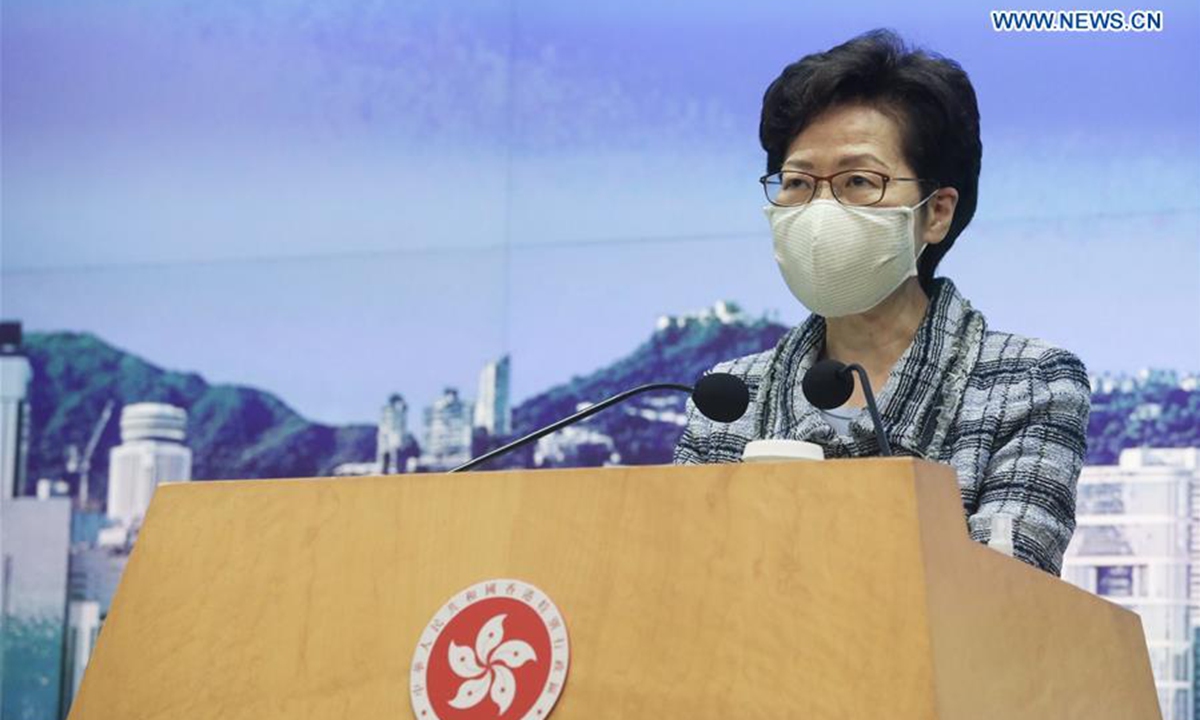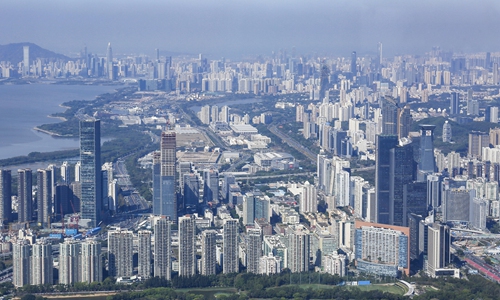Xi’s Shenzhen visit to boost confidence in HK’s development

Chief Executive of the Hong Kong Special Administrative Region (HKSAR) Carrie Lam speaks at a press conference in south China's Hong Kong, Oct. 12, 2020. Carrie Lam on Monday announced that she will postpone her annual policy address originally scheduled on Wednesday. (Xinhua/Lui Siu Wai)
Chinese President Xi Jinping's visit to Shenzhen, South China's Guangdong Province, to mark the 40th anniversary of the establishment of the special economic zone will help instill much-needed confidence for future development of the neighboring city of Hong Kong, whose economy was shattered by riots and the COVID-19 pandemic, said observers, noting that Hong Kong has to lean closer to the Chinese mainland to achieve better development.
The Chinese top leader is expected to deliver a speech at the event on Wednesday, according to the Xinhua News Agency.
Hong Kong Chief Executive Carrie Lam has been invited to attend the Shenzhen Special Economic Zone's (SEZ) anniversary event, she announced at a press conference on Monday.
Lam stated that attending the event in Shenzhen is "significant," as Hong Kong is a contributor to and a beneficiary of Shenzhen's rapid development. "We have full confidence and expectations of future cooperation between Shenzhen and Hong Kong," she said.
Fan Peng, a member of the Chinese Association of Hong Kong & Macao Studies, said Lam's attendance will greatly benefit Hong Kong's development. Lam will better apprehend Shenzhen's role in leading reform and opening-up over the previous decades, and orchestrate plans to deeply converge Hong Kong's development with that of Shenzhen.
Echoing Fan, Tian Feilong, a Hong Kong affairs expert at Beihang University in Beijing, said that the central government's plan for Shenzhen has solidified the city's leading role for the Greater Bay Area development, which poses both an opportunity and a challenge for neighboring Hong Kong.
Lam also announced that the Hong Kong Special Administrative Region (HKSAR) will postpone this year's annual policy address, which was originally scheduled for Wednesday, saying she aims to deliver the annual policy address by the end of November, after visiting Beijing to seek central government policy support.
Lam said she has been invited to visit the capital this month after the Shenzhen event and hold discussions on a list of measures for Hong Kong's development with central government officials.
"The measures cover a wide range of fields and cannot be decided by a single ministry, and some of the measures will require the chief executive to visit Beijing to hold a coordination meeting with different ministries to seek the central government's support," explained Lam.
But the postponement was hyped by some foreign media, including the Guardian, as representing Lam's plan to "please Beijing" and showing her "inability" to govern the region.
"It is a spirit of being realistic and keeping up with the times," Fan told the Global Times. "Hong Kong's decision makers have realized that the HKSAR's development is more reliant on the Chinese mainland than ever before."
Fan said "All decisions will be made by the HKSAR government independently, but this does not prevent the central government from expressing its support and Hong Kong taking the initiative to come into connection, which is also the result of the situation."
"The future direction of Hong Kong needs to be found by the Hong Kong people," Tian noted. "It is not an order, but it rather depends on Hong Kong's willingness and ability to participate in the central policy."
"Certain media hype has failed to see the inevitable cooperation and connection that exists between Hong Kong and the mainland, which Lam has grasped," said Tian. "Hong Kong needs to be integrated into the mainland more than before, especially amid escalating China-US tensions and the COVID-19 pandemic."
The Hong Kong government has revised down its full-year GDP forecast for 2020 to a contraction of 6-8 percent, from one of 4-7 percent decrease announced in late April.

